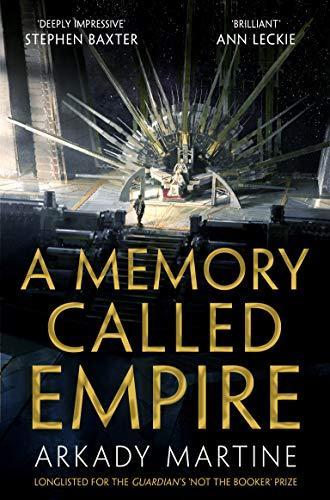Owen Blacker reviewed A Memory Called Empire by Arkady Martine
Review of 'A Memory Called Empire' on 'Goodreads'
5 stars
It’s very common for books to be analogies about another topic; speculative fiction has long been the means by which authors have explored — and invited their readers to contemplate at length — complex topics. Indeed, some of the writing that has made me think the most about imperialism and colonialism are books I’ve reviewed in my June 2021 blogpost of queer fiction.
It’s perhaps less common for a space opera to be a cypher for the author’s postdoctoral research that they should have been writing instead of this novel.
A Memory Called Empire is a space opera where we see a hegemonic empire through the eyes of a newly-appointed ambassador from a small neighbouring polity. As well as an author (and amongst other things) Arkady Martine is a historian with an interest in the eastern margins of early mediæval Christendom; this Hugo-winning début novel is, to some extent, a fictional consideration of the relationship between the Byzantine Empire and the Bagratid Kingdom of Armenia before the latter was annexed in 1044. But don’t worry — this is neither a history book nor an academic text. It’s very firmly a queernorm space opera, with diplomatic machinations and Very Important People™ wrestling for power.
If you want a clearer explanation, before reading the book, about the insidious nature of imperial colonialism, Martine’s interview with Strange Horizons, promoting A Memory Called Empire, is a really interesting read on several topics — imperialism; poetry; how technology could bring about a queernorm society, allowing a polyamorous character to be messy without it being about their bisexuality, co-editing a magazine of creative writing about Climate Justice. And how she met her wife through Star Wars fanfic.
Our protagonist in A Memory Called Empire is the new, urgently-requested ambassador from a small mining space-station to the galaxy-spanning, conquest-hungry empire of Teixcalaan, the centre of civilisation. We see this massive bureaucracy through her eyes as she tries to find out what her predecessor had been up to to get himself killed, while also protecting her station’s interests. The world-building is very rich and detailed, giving a great feel for what Teixcalaan is like — to my mind more so than the first of any other space opera series I’ve read. (And I liked that Teixcalaan seems to me curiously Mexica-themed — character names like Three Seagrass and Thirty Larkspur sit alongside titles like yaotlek for Imperial generals, far too like Nahuatl yāōtl to be coincidence, imho.) And the plot is gripping; not since I was a child have I found myself wanting so much to go to bed early so I can read some more.
The sequel [b:A Desolation Called Peace|45154547|A Desolation Called Peace (Teixcalaan, #2)|Arkady Martine|https://i.gr-assets.com/images/S/compressed.photo.goodreads.com/books/1591755604l/45154547.SY75.jpg|61309907] was released in March 2021.
CN: murder, police brutality, racism and xenophobia, colonial imperialism, house arrest, panic attacks, chronic illness and suicide

